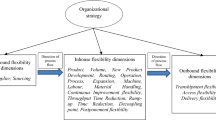Abstract
The tripod consisting of the United States, EU and Japan has advanced to the matured market economy from the growing market economy. In the growing market economy, the economies of scale prevails. In contrast, in the matured market economy, consumers are interested in acquiring goods and services to fit their particular needs, demanding a variety of products and services in small quantities. Accordingly, the advantage of the economies of scale tends to diminish. In order to overcome this difficulty, the authors claim that the 70-30 principle becomes extremely important, where products and services for separate segmented submarkets are designed 70 % in common with remaining 30 % for customization. The purpose of this paper is to identify the emerging trend of the 70-30 principle in Japan and to examine its effectiveness for strategic flexibility and business agility.






Similar content being viewed by others
References
Chen, W., Tseng, S., & Wang, C. (2005). A novel manufacturing defect detection method using association rule mining techniques. Expert Systems with Applications, 29(4), 807–815.
Chien, C., Wang, W., & Cheng, J. (2007). Data mining for yield enhancement in semiconductor manufacturing and an empirical study. Expert Systems with Applications, 33(1), 192–198.
Cowling, K., & Tomlinson, P. R. (2000). The Japanese crisis—A case of strategic failure? Economic Journal, 110(464), 358–381.
Eugene, J. (1997). An analysis of consumer food shop** behavior using supermarket scanner data: Differences by income and location. American Journal of Agricultural Economics, 79(5), 1437–1443.
Gardner, M., Bieker, J. (2000). Data mining solves tough semiconductor manufacturing problems, Proceedings of the sixth ACM SIGKDD International Conference on Knowledge Discovery and Data Mining, 376–383.
Gaston, N., & Nelson, D. (2004). Structural change and the labor-market effects of globalization. Review of International Economics, 12(5), 769–792.
Greaney, T. M. (2003). Reverse importing and asymmetric trade and FDI: A networks explanation. Journal of International Economics, 61(2), 453–465.
Helpman, E., Melitz, M.J., & Yeaple, S.R. (2003). Export Versus FDI, NBER Working Paper, No. 9439.
Helpman, E., Melitz, M. J., & Yeaple, S. R. (2004). Export versus FDI with heterogeneous firms. American Economic Review, 94(1), 300–316.
Horstmann, I. J., & Markusen, J. R. (1992). Endogenous market structures in international trade (natura facit saltum). Journal of International Economics, 32(1–2), 109–129.
Ishigaki, T., Takenaka, T., & Motomura, Y. (2011). Improvement of Prediction Accuracy of the Number of Customers by Latent Class Model, The 25th Annual Conference of the Japanese Society for Artificial Intelligence.
Matsubara, K. (2004). FDI with reverse imports and hollowing out, presented at Fall 2004 Midwest International Economics and Economic Theory Meeting, Washington University in St. Louis, U.S.A.
Peter, S. F., & James, M. L. (1993). Accounting for heterogeneity and nonstationarity in a cross-sectional model of consumer purchase behavior. Marketing Science, 12(3), 304–317.
Rob, R., & Nikolaos, V. (2003). Foreign direct investment and exports with growing demand. Review of Economic Studies, 70(3), 629–648.
Sumita, U., & Isogai, R. (2007). Impact of skeleton imports on hollowing out production bases outside Japan, industrial engineering and engineering management. IEEE International Conference, 2007, 402–406.
Taguchi, M. (2010). Analysis of consumers’ food buying behavior using scanner data (in Japanese). Food System Research, 16(4), 25–31.
Yada, K., Washio, T., & Motoda, H. (2006). Consumer behavior analysis by graph mining technique. New Mathematics and Natural Computation, 2(1), 59–68.
Yomogida, M. (2004). Fragmentation, Welfare, and Imperfect Competition, COE/RES Discussion Paper Series, No. 102, Hitotsubashi University.
Author information
Authors and Affiliations
Corresponding author
Rights and permissions
About this article
Cite this article
Sumita, U., Yoshii, J. Strategic Flexibility in Exploiting Economies of Scope on 70-30 Principle: A Case Study of Japanese Electronics Industry. Glob J Flex Syst Manag 14, 45–55 (2013). https://doi.org/10.1007/s40171-013-0030-0
Received:
Accepted:
Published:
Issue Date:
DOI: https://doi.org/10.1007/s40171-013-0030-0




